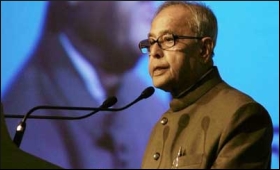|

|
Agri growth single major factor in food security: Prez
|
|

|
|
| Top Stories |
 |
|
|
|
SME Times News Bureau | 05 Feb, 2014
Agricultural growth was a singular contributory factor for food security
and plays a pivotal role in creating employment opportunities and
promoting socio-economic development, President Pranab Mukherjee said
Tuesday.
"By 2030, global food production has to increase by 40
percent to keep pace with the world demand," Mukherjee said at the
inaugural session of the Asia-Africa Agri-Business Forum organised by
industry chamber FICCI.
"One billion people, representing 14
percent of the global population, are still afflicted by hunger. Asia
and Africa account for most of them. This cannot continue any further.
Food production has to proceed in a business-unusual manner; on a war
footing," he said.
The president also said enhanced crop production and productivity were key priorities in Asia and Africa.
Studies
have projected agriculture and agri-business to be a $3 trillion
business in Africa and almost $4.5 trillion business in Asia by 2030.
He
pointed out that the development of agri-business in these continents
has remained stunted due to inefficient utilisation of capacity and
resources and for want of a more favourable policy environment.
"The
sector is plagued by serious constraints in production, demand and
supply, export potential and processing capabilities," he said.
The
president said that in Africa, weak agricultural performance was a
major barrier in the development of the agri-business sector.
The
continent is endowed with 733 million hectares of arable land of which
only 183 million hectares are currently under cultivation.
Similarly, in Asia land availability for agriculture is continuously decreasing due to rising population, he said.
"The
shrinking and deteriorating land resources have to be judiciously used
in order to sustain the needs of the future. Adequate policies,
strategies, technologies and human resources have to be in place," the
president said.
He said the challenge was to translate the woes into business opportunities.
"There
is a need for both the continents to overcome the challenges through
symbiotic associations. Partnerships must aim at developing the
agri-business sector into an efficient business enterprise capable of
competing in other international markets."
On the importance of
Information and Communication Technology (ICT) for agriculture, he said:
"The Accelerating Green Revolution programme in Africa seeks to achieve
a quantum jump in productivity and production levels.
"India,
which witnessed a Green Revolution in the sixties, is now moving towards
an 'Evergreen Revolution', recognising the positive role that
information technology can play as powerful catalyst for sustainable
agricultural development," he said.
Mentioning that the future of
agriculture depends on the adoption of scale-neutral technologies, he
said: "Increased mechanization of the farm sector in India has led to
improvement in productivity.
"India is today a potential source
of high-tech agricultural machinery. Our country can provide
agricultural equipment like harvester, thresher and bailer machinery,
earth moving equipment, tractors and sowing machinery to African
nations."
The president said a shift in focus towards the
development of horticultural crops and food processing industry can
provide the impetus necessary for the overall growth of the agricultural
sector.
"Africa has tremendous scope for benefiting from the
development of the food processing industry. India can provide training
in post harvest management of different crops and provide assistance in
developing packaging technology in line with world standards.
"India has requisite expertise for each level of the value chain and can assist African countries in developing the same."
Mukherjee
underlined the fact that access to agriculture markets and finance as
well as greater public private partnership in agri-business and food
processing sectors in Asia and Africa were essential to unleash their
potential.
"Major investment in infrastructure like irrigation,
water conservation, roads, markets and cold chains is also necessary. I
strongly recommend that the investing firms and banks forge a strategic
partnership to address the credit requirements of both Asian and African
countries.
"This would help the agri-business and food processing sectors to meet their requirement for finance," the president added.
|
|
|
| |
|
|
|
|
|
|
|
|
|
|
|
|
|
|
| |
| Customs Exchange Rates |
| Currency |
Import |
Export |
US Dollar
|
₹91.35
|
89.65 |
UK Pound
|
₹125.3
|
₹121.3 |
Euro
|
₹108.5
|
₹104.85 |
| Japanese
Yen |
₹58.65 |
₹56.8 |
| As on 19 Feb, 2026 |
|
|
| Daily Poll |
 |
 |
| What is your primary "Make or Break" expectation from the Finance Minister this year? |
|
|
|
|
|
| Commented Stories |
 |
|
|
|
|
|
| |
|